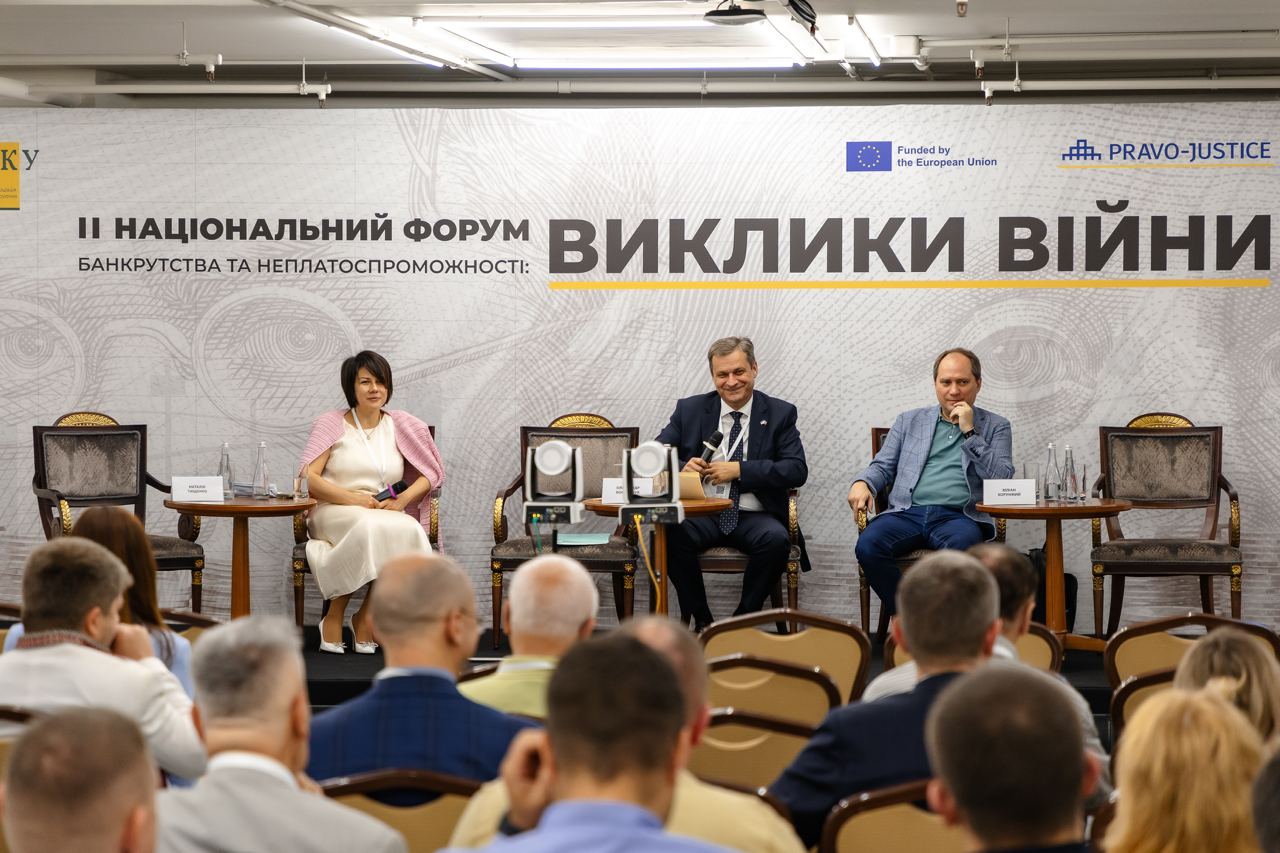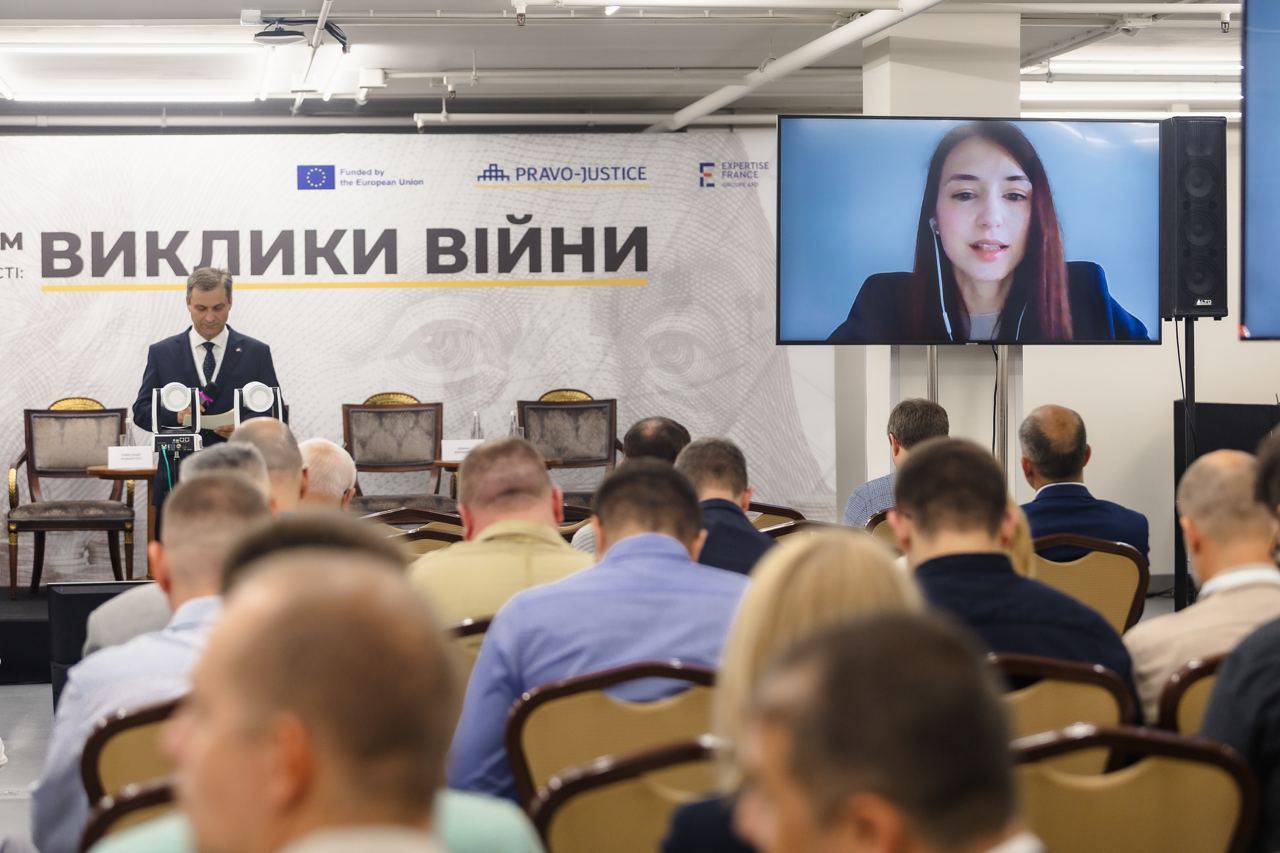II National Forum “Insolvency and Bankruptcy in Ukraine. Wartime Challenges” took place with the support of EU Project Pravo-Justice

On 14 June, II National Forum “Insolvency and Bankruptcy in Ukraine. Challenges of Wartime”, organised by the Ukrainian National Insolvency Trustees Association with the support of EU Project Pravo-Justice. Representatives of the Ministry of Justice of Ukraine, MPs, judges, the Supreme Court justices, the Independent Association of Banks of Ukraine, Ukroboronprom JSC, bankruptcy trustees, lawyers, and EU Project Pravo-Justice experts attended the event.
Mykola Lukashuk, the first Chair of the UNITA, Chair of the Dnipro Regional Council, stressed that in light of European integration commitments and challenges associated with the consequences of a full-scale war, insolvency mechanisms can play a crucial role.
"Investors want to have guarantees that they will get 100% of their investments back. At the same time, the UNITA has to operate to keep the businesses functioning. Bankruptcy trustees are leaders who know how to protect the interests of national business. It is also important to have unified and clear jurisprudence that will defend not only the creditors’ interests," said Mykola Lukashuk.

Oleksandr Bondarchuk, Chair of the UNITA, spoke about the Association’s work in wartime.
"Despite the challenging circumstances, UNITA is adjusting to the martial law – it still operates, builds up its capacity, organises events helpful to the community, participates in drafting laws, and protects bankruptcy trustees," said Bondarchuk.

Oksana Tsymbrivska, Team Leader of EU Project Pravo-Justice, said that the area of bankruptcy and insolvency will receive considerable attention during Ukraine’s accession negotiations with the EU. It will be necessary to align not only legislation, but also key economic and financial processes.
"Ukraine has already embarked on the path of aligning its national legislation with EU legislation. Our Project actively supported the Ministry of Justice with the self-screening. There has also been significant progress in the area of bankruptcy and insolvency. In particular, the draft law on the implementation of Directive 2019/1023 on the principles of preventive restructuring is already pending a vote in the second reading," said Oksana Tsymbrivska. She noted that the elaboration of this document was a good example of high-quality cooperation and involvement of all key stakeholders, including representatives of the Parliament, the Ministry of Justice, the UNITA, judges and EU Project Pravo-Justice experts.
She also said that aligning national legislation with the EU Directive is a condition for Ukraine to receive macro-financial assistance, as well as a significant step for Ukrainian businesses to overcome the hardships caused by the war.
Oleksii Movchan, Deputy Chair of the Parliamentary Committee on Economic Policy, spoke about legislative developments in the field of insolvency, as well as the timeframe for their implementation. In particular, he noted that MPs plan to adopt Draft Law No. 10143 on preventive restructuring by September 2024.
"Social relations are constantly evolving, causing new challenges to emerge. Therefore, it is necessary to regularly update the legislation to ensure that it meets the country's current context and economic situation. We will continue improving the legal rules governing insolvency. Currently, the No. 1 task is to implement the EU Directive on Preventive Restructuring into national legislation," said Oleksii Movchan.
Yulian Khorunzhyi, Senior Partner of Ario Law Firm, spoke in more detail about the rationale of draft law No. 10143 and its preparation for the second reading.
"The legislative initiative will enable micro, small and medium-sized businesses to avoid potential insolvency. A number of exemptions are offered to such companies compared to large businesses. For example, they will be able to initiate a preventive restructuring procedure without a preventive restructuring plan, simply by declaring their assets and liabilities and offering their vision of overcoming temporary financial difficulties. Then bankruptcy trustees are involved – they provide advice, help small businesses prepare a restructuring plan, and negotiate with creditors to approve it," said Yulian Khorunzhyi.
He also noted that the said document is expected to enter into force in January 2025.

Vladyslav Filatov, Director of the Bankruptcy Department of the Ministry of Justice of Ukraine, highlighted how important it is to implement Automated System “Bankruptcy and Insolvency” launched on 1 June this year. EU Project Pravo-Justice helped with the procurement of the software for the system. Moreover, he outlined the directions of the Ministry of Justice’s regulatory policy on the work of bankruptcy trustees.
"The requirements for bankruptcy trustees will only increase as the requirements for bankruptcy cases become more demanding. That is why UNITA members should constantly develop their skills and acquire knowledge not only regarding liquidation, but also restructuring," said Vladyslav Filatov. He noted that it is crucial that competition law practice is already forming in Ukraine.
Besides the prospects for the development of insolvency mechanisms, the attendees focused on the subsidiary responsibility of debtors’ directors and owners, fraudulent transactions, peculiarities of bankruptcy in the TOT and the war zone, the impact of sanctions on insolvency, jurisprudence, and discussion of practical cases.